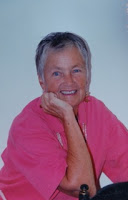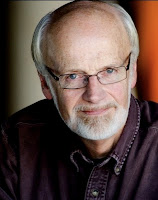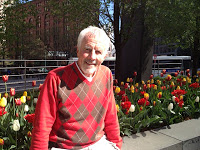This question is so obviously a scientific one, although it goes against my nature, it’s only fair I give it a scientific reply. I did a little checking, and I see there is a Queer Scale, or Queer Magnitude Scale, just like there’s the Richter Magnitude Scale for earthquakes and the Saffir-Simpson Hurricane Scale for hurricanes. And just like with these other two scales, there are numbers indicating severity. For example, with the Richter Magnitude Scale you can have a 4.Oh to 4.9 earthquake, which, according to the Richter Scale, means a light earthquake, with noticeable shaking of indoor items, rattling noises, but no significant damage. With the Saffir-Simpson Hurricane Scale, you can have a Category 2 hurricane, which means winds of 96 to 110 mph, winds strong enough to lift mobile homes and snap the anchorages of small craft; extensive to near-total power outages are likely. Similarly, with the Queer Magnitude Scale, or QMS, you can have a 4.Oh to 4.9 queer, which means a light queer, with noticeable shaking of indoor items, rattling noises, but no significant damage. Or a Category 2 queer, strong enough to lift mobile homes and snap anchorages, but people living in brick homes or well-built high risers are probably okay.
Now I’m going to take a look at my life–to see if I can answer this question: Just how queer am I? And for simplicity’s sake, so we don’t keep having to go back and forth, let’s just put the QMS (remember, that’s the Queer Magnitude Scale) up against the Saffir-Simpson hurricane scale, Categories 1, 2, 3, 4 and 5–5 being the meanest, toughest, most destructive.
I started out like most of us, at puberty or maybe a little before, as a Category 1 queer. Now if I’d been a hurricane, that would have meant, as a queer just starting out, there would not have been much structural damage. Maybe a few shingles blown off, a few crushes on boys that made no sense, but that’s about it. According to the QMS, life, as a Category 1 queer, is almost always survivable.
When I was a teen growing up in The Bronx, I got my first job: Christmas part-time in a suburban Macy’s; men’s dress shirts. There was this guy, my age–let’s call him Nicky B.–working the same evening shift. One night going home in a lightly falling snow, me to the elevated subway, Nicky B. to his home, which was within walking distance, Nicky B. grabbed my hand and led me into an apartment building and into a deserted stairwell where we had a little fun. That was my first time. And even though it was my first time, I liked it enough to know that I was now a Category 2 queer. If you recall, a QMS Category 2: small craft snap their anchorages. My anchorage had been snapped, all credit to Nicky B.
I remained a QMS Cat 2 queer all through high school, all through my undergrad years, but then came Army and graduation to Category 3. Between the stairwell and the Army there had been a couple of Category 2.2’s and 2.6’s, but I can’t boast making it all the way to a Cat 3 until the Army. And Mark C. The setting is South Korea. Winter. Christmas Eve. (I’ve made it a practice to always upgrade my QMS at around Christmastime.) The officers’ club: a jumbo Quonset hut overlain with snow. Night: late enough so that all of us junior officers are morosely shitfaced . . .
Before I bring Mark C. into the picture: according to the Saffir-Simpson Scale, a Category 3 hurricane is described as a “major hurricane,” capable of inflicting significant damage to a building “lacking a solid foundation,” to include the “peeling off of gable-end roofs” and the “penetration of inner curtainwalls.” Damage, according to Saffir-Simpson, can be “irreparable . . . “
Enter: First Lieutenant Mark C., Alpha Battery commander, gruff, tough, recruiting-poster good-looking. He sits down next to Second Lieutenant Ray K., battalion adjutant (adjutant? that’s what they do with guys with English Lit. B.A.’s)–Second Lieutenant Ray K., self-conscious, mild, rapidly balding. A few whiskeys and First Lieutenant C. invites Second Lieutenant K. back to his hooch (hooch: Army lingo for quarters; quarters: regular people lingo for bedroom) to admire his new Samsung Acoustics Subwoofer Speaker System. We spend a quarter-hour tasting Wild Turkey and looking at the subwoofers; then turned–to my woozy surprise–to peeling off gable-end roofs and penetrating inner curtainwalls–definitely Category 3 stuff.
I left the Army after Korea, Missouri, and Vietnam (Missouri being the most terrifying of the three). Toss in a couple of Category 3-point-this & that’s before I got to my QMS Category 4 level. Those point-this & that’s all happened after I’d moved to Colorado and was going to grad school: Western State in Gunnison, and, after that, D.U. . . .
In fact, it was in the D.U. Theatre Department where I met Jake. No last initial needed. Jake was one-of-a-kind. The singular love of my life: five years younger, red-headed, perpetually cheerful, a fine actor and a frighteningly good cartoonist. You could say, when I met Jake, right then and there I applied for promotion to Category 4. Saffir-Simpson warns: “Category 4 hurricanes tend to produce more extensive curtainwall failures . . . ” (un-huh) ” . . . with some complete structural failures: some homes are leveled. There may be extensive beach erosion, with terrain flooded far inland. Total and long-lasting electrical and water losses are to be expected.” (un-huh) Jake and I were a couple for a long, long time. We were definitely QMS Category 4 queers. Had we the chance back then, we would have become Category 4 married queers. But we didn’t have that chance. We’d become QMS Cat 4’s about three decades too soon. But we had a good life together, Jake and I: Denver, New York, Denver again, San Diego, Seattle, and San Diego for a second time: a good, happy life.
But, just like with hurricanes, the one-of-a-kind loves of a guy’s life–even Category 4 loves–sometimes move inland, their fierceness dissipate, their strong winds subside. Jake now does motion-capture animation with a film studio in Tel Aviv. He’s alone, living singly, and I’m genuinely sorry that’s true.
I’ll stop here. I’ve never been a QMS Category 5 queer. I’m not sure what that would feel like. I know Saffir-Simpson says: “Category 5 hurricanes are the highest category of hurricanes. Complete building failures are a certainty, with some buildings totally blown away. Only a few types of structures are capable of surviving intact.” To be honest, I’m not sure I’d ever want to be a Category 5 queer. Katrina was a Category 5 hurricane. I’m afraid if ever I had a chance to be a Category 5 queer, I’d find myself, years–after my Mother of All Loves had moved inland–I’d find myself still waiting for some relief from the damage done to me, inside and out, still living among the debris of a Cat 5 relationship that was too wild, too strong, too indiscriminate.
And probably still living in a F.E.M.A. trailer.
About the Author
Colin Dale couldn’t be happier to be involved again at the Center. Nearly three decades ago, Colin was both a volunteer and board member with the old Gay and Lesbian Community Center. Then and since he has been an actor and director in Colorado regional theatre. Old enough to report his many stage roles as “countless,” Colin lists among his favorite Sir Bonington in The Doctor’s Dilemma at Germinal Stage, George in Who’s Afraid of Virginia Woolf? and Colonel Kincaid in The Oldest Living Graduate, both at RiverTree Theatre, Ralph Nickleby in The Life and Adventures of Nicholas Nickleby with Compass Theatre, and most recently, Grandfather in Ragtime at the Arvada Center. For the past 17 years, Colin worked as an actor and administrator with Boulder’s Colorado Shakespeare Festival. Largely retired from acting, Colin has shifted his creative energies to writing–plays, travel, and memoir.



